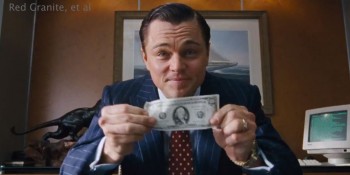Martin Scorsese has made some great films. His 2006 Best Director Academy Award for The Departed was long overdue. Unfairly for moviegoers and fellow moviemakers alike, though, each new film attached to Scorsese’s name seems to be automatically entered into the Best Picture conversation. His latest, The Wolf of Wall Street, should have no place in that discussion.
The film is a big-budget exhibition of the excesses and pitfalls of unrestrained capitalism. Leonardo DiCaprio leads the cast in the role of Jordan Belfort, a brash stock trader who remorselessly swindled clients out of millions of dollars throughout the better part of the 1990s. Belfort immersed himself in greed, drugs, prostitutes, and ego before attracting the attention of the FBI for the illegality of his dealings.
The Wolf of Wall Street is a story told in two acts: the rise and the fall. The depiction of the rise has drawn the attention of any number of commenters for its strong language and graphic representation of drug use and womanizing. Some fret that these portrayals are a glorification of the lifestyle, and I must admit that I found myself using the word “cocksucker” much more frequently than usual in the hours after I finished watching the movie. But it will become clear to anyone who can endure all three hours of this film that these exorbitances are played out on-screen to illustrate the disconnect between Belfort’s outward enjoyment of life and the private turmoil he endures.
Sound trite? It is, as is every theme of the movie.
Greed is bad. Drugs are bad. Orgies with hookers ruin marriages. None of this is earth-shattering, and all of it has been portrayed on film before — and, in many cases, it has been done better. (DiCaprio’s Belfort even references Gordon Gekko, explicitly closing the circuit between the two preeminent Wall Street films.) Wolf is flashy and adrenaline-fueled, but that should not be enough to warrant consideration by the Academy.
Even Belfort’s fall is unsatisfying. It will not take away from the viewer’s enjoyment of the movie to reveal that the feds eventually catch up with the scheme; this is an obvious part of the basic storytelling arc. Unfortunately, what could be an intriguing cat-and-mouse game plays out in an uninspired series of events that takes us on a superficial tour of the European banking system. Sure, we get to see Jean Dujardin and a few more naked women, but these elements add no depth to the story or characters.
If there is one refreshing fact about The Wolf of Wall Street, it is that it has no contrived “reformation,” feel-good ending. Belfort, who himself appears in the penultimate scene of the movie, is still a prick; he has moved on to a life of “motivational” speaking, which is an inevitability that DiCaprio, to his credit, teased out of Belfort’s personality from his first speech to the assembled employees of Stratton Oakmont.
Unfortunately, this reality means that if you paid to see this movie, not only did you waste your money, but you also financed Belfort’s ongoing predatory deception. The man has made nearly $1.8 million from the publication of his book and the sale of its movie rights. Half of that income is required to be paid in restitution for Belfort’s crimes, but federal prosecutors claim he has paid out only $243,000 in the past four years.
I am surely in the minority here, but I have never been a fan of DiCaprio’s acting. The first hour of Wolf does nothing to change my opinion that DiCaprio’s range is usually limited to portraying Leonardo DiCaprio. By hour two, though, he does disappear into the character of Belfort, and his Quaalude trip to the country club is an entertaining bit. Still, DiCaprio, with his Best Actor nomination, seems to get the same nod and wink from the Academy bouncers as Scorsese does.
Jonah Hill is entertaining as Belfort’s sidekick, Donnie Azoff, and relative newcomer Margot Robbie has no trouble sharing the screen with the veteran DiCaprio, her on-screen husband. The most enjoyable performance, however, is the all-too-brief appearance of a gaunt Matthew McConaughey, obviously pulling double duty between this and the role for which he will win Best Actor.
My treatment of The Wolf of Wall Street has been harsh, which is not to say the film is a bad one. Were it an hour shorter, it might well be a fun, escapist distraction, along the lines of American Hustle (a fine film, but another that does not deserve a Best Picture nod). But in comparing the movie to masterful works of art like 12 Years a Slave, Dallas Buyers Club, and Her — and we must, because the Academy has deemed them peers — Wolf falls woefully short.
